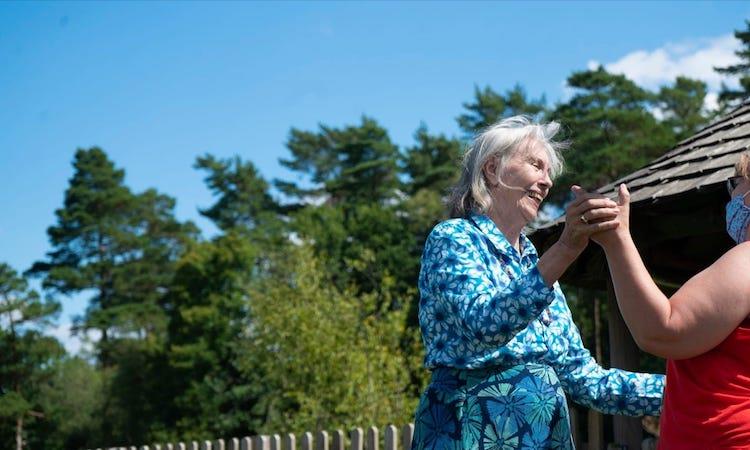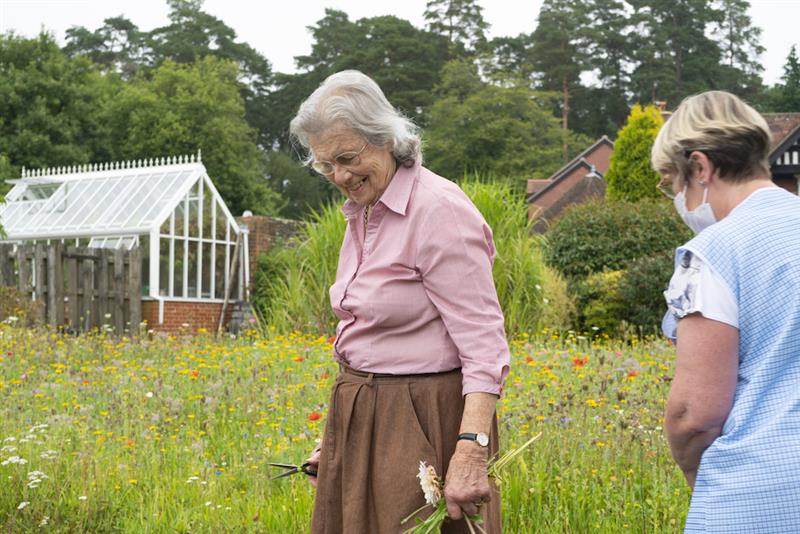Many care homes provide dementia care, but there is a difference between care homes that accept people with dementia and specialist dementia care homes. The former might have some signage dotted around to help people orientate themselves. The latter will have a robust culture of care, usually implemented as a care model, which is seen in every interaction between the staff and residents.
The Butterfly Approach
Ever since Langham Court opened in 2013 it has been an accredited Butterfly home. The Butterfly approach is a care model that focuses on enabling people to be ‘Free to be me’. In essence, Langham Court encourages people to express their feelings in ways that traditional care homes often ignore or attempt to control.
Butterfly Home Audit
https://www.youtube.com/watch?v=j_iJyX_x0m8
A Butterfly audit, which is required for accreditation, identifies a sliding scale of 5 different types of care interactions – meaningful, positive, neutral, negative, and controlling. The majority of care homes that are audited have 70% of interactions (between staff and residents) in the neutral, negative and controlling categories. To be an accredited Butterfly home, 70% of interactions must be in the meaningful and positive categories.
Positive Interactions Versus Negative Interactions
Examples of these types of interaction can be found in everyday occurrences, such as something as simple as making toast.
- A meaningful interaction might be a carer asking what you would like on your toast, sitting next to you while spreading your preferred choice, and reminiscing about how the smell of toast reminds them of their childhood.
- A positive interaction would perhaps look similar to one you might have experienced at a hotel breakfast buffet. Well, a decent one anyway, where a waiter gives you a choice, a smile and a bit of small talk, but doesn’t sit down and join you.
- A neutral interaction is the bad buffet equivalent where something you ordered on a tick sheet the night before is plonked down in front of you with little or no personal interaction.
- A negative interaction might involve being encouraged to wait until lunch because it is getting late. The intention might be good, so as to not spoil your appetite, but it is denying you choice and independence.
- A controlling interaction could be denying you toast altogether due to already having had some, and perhaps talking over you to another member of staff saying that you’re always asking for toast when you’ve already had some.
Limiting interactions to neutral, negative and controlling tends to go one of two ways. People either become compliant and withdrawn or frustrated and annoyed. People with dementia, whose ability to control these emotions has been lost, either become upset and depressed or irritable and aggressive, and can become labelled by these behaviours forever.
The Approach of The Carer Influences Behaviour In Dementia Patients
Professor Tom Kitwood, whose core principles of person-centred care helped shape the Butterfly approach, identified that it is not necessarily the dementia that causes people to display challenging behaviour but the approach of the people caring for them. This is why Butterfly homes, with a majority of positive and meaningful interactions, have such successful outcomes for people with dementia, especially those who may have previously been labelled ‘aggressive’.
It does not necessarily mean that people stop displaying such behaviours. We all get frustrated from time to time, and having dementia presents a whole host of situations that almost anyone would find frustrating. But Butterfly homes see these behaviours as a form of communication rather than a reflection of someone’s personality.
Butterfly Homes Use An Emotional Risk Assessment Tool
A common occurrence of such behaviours can be while providing personal care, which is necessary to prevent infections but can be incredibly upsetting for people with dementia. When clinical care needs to be carried out there is a risk that keeping someone safe comes at a cost to their wellbeing. In these situations, Butterfly homes often use an emotional risk assessment tool to make sure clinical and emotional care are balanced, and such care is provided for the person, not just their condition.
An emotional risk assessment might look at how frequently personal care is required and what time of day it is provided rather than fitting it in with the daily routine of the home when it suits the staff rather than the resident. If this doesn’t work, and personal care causes distress regardless, Butterfly homes might allocate a different member of staff to the one providing the physical care to visit the person afterwards to support them emotionally.
It is this emphasis on emotional care and meaningful interactions that all specialist dementia care homes should have. If you are looking for a specialist dementia care home, simply spend a minute or two observing a lounge or day area, and count the different types of interaction, as outlined above.
If you’d like to learn more about our Butterfly Home Langham Court, please click here
To see if there is a Butterfly home near you, check the map at the link below.
https://meaningfulcarematters.com/partners/




